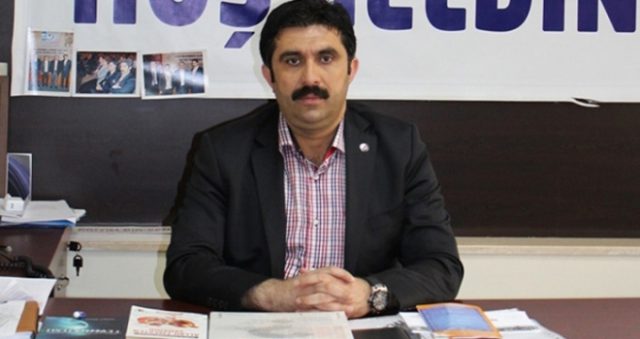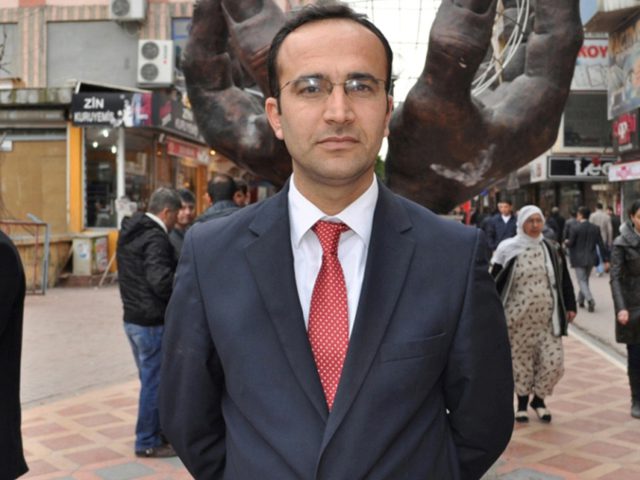Unions Grade the Educational System: It Can Hardly Pass the Class

We asked about the first term of 2017-2018 educational year to union representatives and rights activists. Eğitim Bir Sen (an education trade union in Turkey) Diyarbakır Branch chairperson Yunus Memiş and Özgür Eğitim Sen (another education trade union in Turkey) Batman representative Mustafa Sevinçer made these evaluations: Hello, could you please make a general evaluation […]
We asked about the first term of 2017-2018 educational year to union representatives and rights activists. Eğitim Bir Sen (an education trade union in Turkey) Diyarbakır Branch chairperson Yunus Memiş and Özgür Eğitim Sen (another education trade union in Turkey) Batman representative Mustafa Sevinçer made these evaluations:
Hello, could you please make a general evaluation of our educational system and last school term in particular?
 Yunus Memiş: The first term of the 2017-2018 educational year was shadowed by one-day policies and unsustainable decisions such as the repeal of TEOG, the exam of transition from primary to secondary education, and change in the exam of higher education. People’s demands about changing fields were not met, the pilot scheme of teachers’ performance evaluation caused uneasiness, violence continued to increase against teachers and people faced many problems during their transposition process. These are among the huge problems seen in the first term of this school year.
Yunus Memiş: The first term of the 2017-2018 educational year was shadowed by one-day policies and unsustainable decisions such as the repeal of TEOG, the exam of transition from primary to secondary education, and change in the exam of higher education. People’s demands about changing fields were not met, the pilot scheme of teachers’ performance evaluation caused uneasiness, violence continued to increase against teachers and people faced many problems during their transposition process. These are among the huge problems seen in the first term of this school year.
There are still unsolved problems such as inequality in the merits of additional courses, unjust course fees, the budget problem of schools, foreign language pilot scheme, improper formation of counseling services, unfinished reformation of the inspection system, questions on the system of transition to secondary education. Employing teachers by interviewing or contract teachers remind the caste system and these regulations should be repealed immediately. In short, there are still many problems waiting to be solved in the system. Last year, before the educational year started, approximately 4500 teachers had been suspended or dismissed. That almost paralyzed the educational system. We reacted strongly and said these investigations were wrong. We said there were victims of by-lock trap.
This year is much better and more promising in every way. New directors were assigned, suspended teachers were given back to duty. Lastly, by-lock victims were back to their duties and that made both public and educational communities happy. New teachers were assigned. Our schools, particularly by the support of municipalities, were renovated. Even it is not enough, schools now have new cleaning and security staff, thanks to the TYP project, the programme for the public interest.
 Mustafa Sevinçer: Last year was a chaos because of the changes in TEOG, the exam of transition from primary to secondary education. Until Mr. President ordered the cabinet to repeal TEOG, senior officials from the Ministry of Education was praising the exam system. Our educational system is so fond of change that it even pushes the reality of “change alone is unchanging”. It can barely start a day without a change. There are many problems coming with it such as the law on the unification of education, wrong teacher policies, curriculum etc. I think each day is a shadow of itself. Statistics and numbers also show so. We cannot deny the positive developments in the system; however, we still cannot do well enough. Our failure in PISA is obvious. Of course, PISA is not the only criteria to evaluate an educational system, but it is a very important exam and as a country, we fail that exam. In 2016, we fell behind of the results we received in 2003.
Mustafa Sevinçer: Last year was a chaos because of the changes in TEOG, the exam of transition from primary to secondary education. Until Mr. President ordered the cabinet to repeal TEOG, senior officials from the Ministry of Education was praising the exam system. Our educational system is so fond of change that it even pushes the reality of “change alone is unchanging”. It can barely start a day without a change. There are many problems coming with it such as the law on the unification of education, wrong teacher policies, curriculum etc. I think each day is a shadow of itself. Statistics and numbers also show so. We cannot deny the positive developments in the system; however, we still cannot do well enough. Our failure in PISA is obvious. Of course, PISA is not the only criteria to evaluate an educational system, but it is a very important exam and as a country, we fail that exam. In 2016, we fell behind of the results we received in 2003.
Do you think our educational system addresses students’ interests and abilities? Does the system help students to provide a habit of living peacefully together with all the differences? Is it sensitive to human rights?
Yunus Memiş: Constant changes in our educational system have negative effects. However, some changes are also promising. The 4+4+4 system directs students according to their interests in their early ages. Parents are mostly content with it. High school students are given the chance to choose between different types of high schools such as physical/social sciences schools, language intensive schools, vocational or religious vocational schools etc. It is a good system I think. The most important thing here is to direct middle school students properly. It is pleasing and encouraging to see that our existing educational system provides students the opportunity to live together with all the differences. I can say we are now better than the past. I should say that our teachers have a great impact on it.
Mustafa Sevinçer: We don’t think the educational system addresses students’ interests and competencies. On the contrary, we believe that the system blunts their interests and abilities. It is mostly because the education system has been used for ideological indoctrination since the republic’s foundation. It is way too optimistic to expect this kind of educational curriculum to address students’ interests and abilities. Eighth-graders and high school students used to have a lesson called “human rights”. That lesson was then added to other subjects as social sciences. However, I think the content is not enough.
Teachers are the most important part of education. What do you think about their status in the system?
Yunus Memiş: Teachers are the backbone, the most important figure of our educational system. Teachers are not only the ones who teach and educate, they are also a very important guide for students. Teachers stand right in the middle of our system. There are both positive and negative sides to it. We converted to the student-oriented system within time, but still, some of the teachers continue applying teacher-oriented system. Teachers should renew themselves, they should be researchers. Our teachers hardworking to be so, but still, it is not enough due to some certain reasons. If they succeed in being researchers and adoptive, this will directly affect the students and the system. We know that even in the worst educational system if teachers are successful, productive and curious, the system naturally improves and gains momentum. I congratulate our teachers for their hard work. Their sacrifices and works are priceless. I don’t think they get what they deserve in terms of money. It is only a tool to get by. Their services are invaluable. Nonetheless, the government should take steps to improve teachers’ status both economically and intellectually. If a teacher’s only struggle is to try to get by in his/her life, then s/he would not be successful in his/her profession. We achieved a lot in terms of employee personal rights. I know that these are not enough. We still have a lot to do. Wages should be equal to the real expenses. Additional course fees should increase. Every teacher should have the right to buy a house and a car on easy terms. Single teachers should receive marriage payments and financial support for their travels at least once a year.
Mustafa Sevinçer: Teachers’ status within the system is not good. Teachers do not have satisfying employee rights in return for their constant efforts. The Union should be reformed, I think. I believe that the very existing perception of education trade unions is the reason for their members’ conditions. Fractions between unions serve well to the system. The main problem with the unions is that they function like “a backyard” of certain political parties. Because, unions give up on their ideals -firstly on their education policies- to benefit from their closeness to the governing party. This is also the case with the employee rights, unions usually do not struggle hard to change some decisions. Why? Because the authorized union negotiates with the government. Which union is authorized? Of course, the closest one to the governing party. So, is it really possible for this union to fight for teachers’ rights? No, it is not, and it is not only happening today. It was the same 10 or 20 years ago. This is very bad. It does not matter which union is in charge. It is the same attitude of any union that is engaged to the government.
What positive or negative effects does the centralized management of our educational system leave in Diyarbakır?
Yunus Memiş: I can say the centralization of the educational system is positive in terms of following and improving the conditions of modern times. We can find our place in the ever-developing educational system with projects like Fatih, EBA and Khan Academy. We join TUBİTAK (The Scientific and Technological Research Council of Turkey) competitions and raise awareness. I don’t think there many negative aspects of it. Those negative effects are mostly related to our traditions and culture and we can make it compensate for it thanks to our productive teachers. I appreciate the efforts of the teachers and I thank them for their successful work. Although the centralized educational system has its handicaps, I can say it is the ideal solution in this globalizing world.
Mustafa Sevinçer: I think, centralization is wrong both in politics and in the educational system. Being local and individual is the correct option. Each child has a different learning process just as each geographical area, culture, and society has different layers. That is why locality and legitimacy are essential when education policies are determined and applied. Because, if you develop a system based on Çankaya, Ankara and apply the same system in Kars or Edirne, you will miss the reality.
How would you grade the educational system in terms of students’ personality developments, school-daily life relations, and teachers’ satisfaction? What would your grade be out of 10?
Yunus Memiş: Some of the mentioned topics is developing, we fall behind with some of those and we are doing well with the others. Still, on an average, I think 6 points would be reasonable.
Mustafa Sevinçer: I will be generous and give 5 points.

Bizi Takip Edin